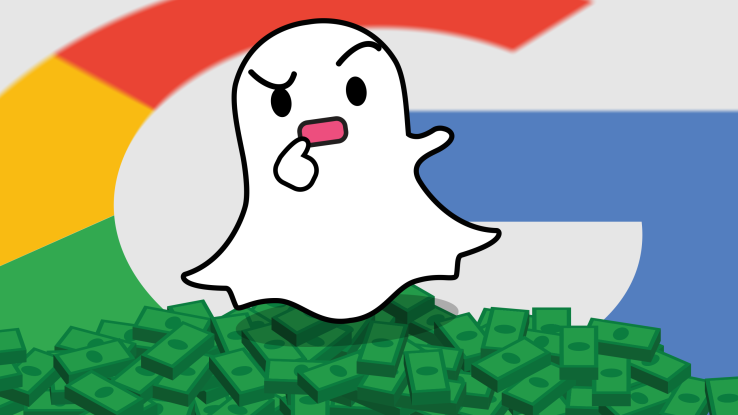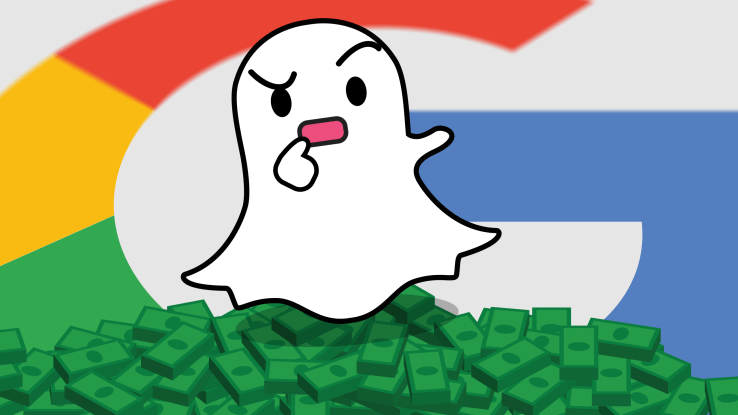

Nerdy Google has failed at social time and time again, so it considered buying teen sensation Snapchat. The search giant held informal talks with Snap and floated an offer of $30 billion in 2016 before Snap’s last funding round, and just before its IPO this year, according to Business Insider’s Alex Heath. That offer was apparently an open secret inside Snap, and was on the table after the IPO, too.
But Snap’s notoriously independent CEO Evan Spiegel has apparently showed no interest in selling out to Google or anyone else. That’s despite the startup’s market cap slipping to around $15 billion after soaring as high as $30 billion when it IPO’d in May.
News of Google’s interest helped Snap’s share price climb around 2.3 percent today. The uptick comes after weeks of decline due to lockup expiration finally allowing insiders to sell stock, and strong growth for Facebook’s Instagram Stories and WhatsApp Status clones of Snapchat.
Google declined to comment to Business Insider and Snap told TechCrunch “these rumors are false.” It’s possible that Google’s interest was very preliminary, and likely never rose to Snap’s higher ranks. It’s standard for startups to explore alternative paths before taking significant funding rounds or going public.

Snap CEO Evan Spiegel (left) and his advisor and Google Executive Chairman Eric Schmidt (right)
Google’s growth-stage investment fund CapitalG ended up investing in Snap after the 2016 talks went nowhere, contributing to the round valuing the “camera company” at $20 billion. The organizations have long been buddy-buddy. Google chairman Eric Schmidt was an adviser to Spiegel, Snap runs Google’s office software suite and Snapchat has committed to spending $2 billion on Google Cloud hosting over the next five years.
At the time of the May 2016 choice to go with raising money instead of being acquired, Snap looked unchallenged in the full-screen Stories social media game. But in August, Instagram’s soon to be wildly successful Stories clone launched, which has diverted growth, mind share and advertisers from Snap ever since.

Joining forces could be beneficial to both companies. Google would get a top social property to make up for its Google+, Buzz and Wave flops. It could also reap data about people’s social graphs, where they spend time and what topics they care about, allowing it to improve its ad targeting and measurement.
Snap would gain a deep-pocketed parent that could provide extra capital to make acquisitions and build out its R&D-heavy augmented reality technology. Machine vision and image recognition algorithms from Google Search could unlock information about what’s in everyone’s Snaps. Google’s advertising expertise and connections could boost Snap’s ad revenue.
Together, they could align their Google Glass and Snap Spectacles hardware efforts to build a powerful but appealing AR device. However, Google’s open, engineering-driven culture could clash with Snap’s secretive, design-driven culture.

But Spiegel is the real stumbling block. He and his co-founder Bobby Murphy have configured Snap’s voting rights to give them full control over the direction of the company, denying public backers any say. So even if investors would love to take the $30 billion offer that’s double Snap’s current market cap, they couldn’t compel it to do so. Spiegel famously rebuked Mark Zuckerberg’s offers to buy Snapchat, and is known for following his gut over outside advice.
As we wrote before the IPO, to bet on Snap is to bet on Spiegel — for better or worse. His sixth sense for product produced ephemeral messaging and Stories, while his eye for acquisitions gave Snap Bitmoji and AR face filters. But with Snap drowning under Facebook’s competition, Spiegel’s renegade style could see the company refuse life preservers even as it sinks.

